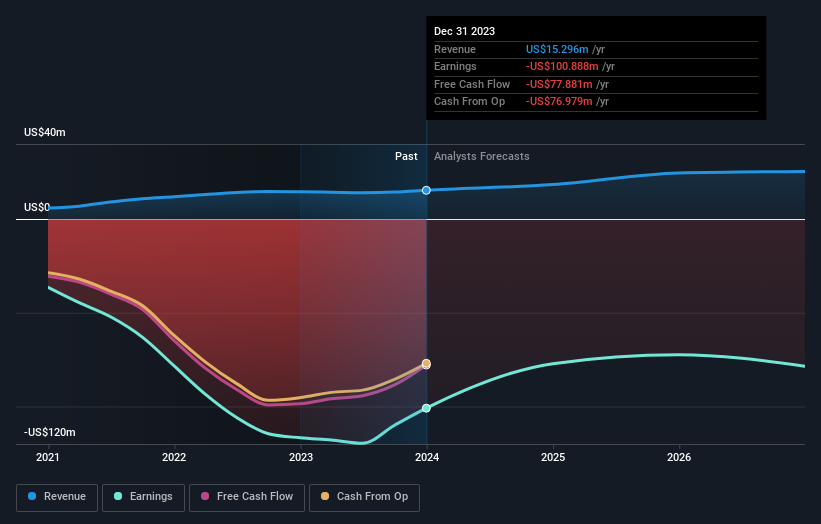DermTech, Inc. (NASDAQ:DMTK) Analysts Are Cutting Their Estimates: Here's What You Need To Know
Shareholders in DermTech, Inc. (NASDAQ:DMTK) had a terrible week, as shares crashed 31% to US$0.87 in the week since its latest yearly results. The results overall were pretty much dead in line with analyst forecasts; revenues were US$15m and statutory losses were US$3.09 per share. The analysts typically update their forecasts at each earnings report, and we can judge from their estimates whether their view of the company has changed or if there are any new concerns to be aware of. With this in mind, we've gathered the latest statutory forecasts to see what the analysts are expecting for next year.
See our latest analysis for DermTech
Taking into account the latest results, the consensus forecast from DermTech's six analysts is for revenues of US$18.3m in 2024. This reflects a solid 20% improvement in revenue compared to the last 12 months. Losses are predicted to fall substantially, shrinking 33% to US$1.98. Before this latest report, the consensus had been expecting revenues of US$19.6m and US$2.04 per share in losses. It looks like there's been a modest increase in sentiment in the recent updates, with the analysts becoming a bit more optimistic in their predictions for losses per share, even though the revenue numbers fell somewhat.
The consensus price target fell 5.6% to US$3.40, with the dip in revenue estimates clearly souring sentiment, despite the forecast reduction in losses. Fixating on a single price target can be unwise though, since the consensus target is effectively the average of analyst price targets. As a result, some investors like to look at the range of estimates to see if there are any diverging opinions on the company's valuation. There are some variant perceptions on DermTech, with the most bullish analyst valuing it at US$4.00 and the most bearish at US$2.50 per share. As you can see, analysts are not all in agreement on the stock's future, but the range of estimates is still reasonably narrow, which could suggest that the outcome is not totally unpredictable.
These estimates are interesting, but it can be useful to paint some more broad strokes when seeing how forecasts compare, both to the DermTech's past performance and to peers in the same industry. It's pretty clear that there is an expectation that DermTech's revenue growth will slow down substantially, with revenues to the end of 2024 expected to display 20% growth on an annualised basis. This is compared to a historical growth rate of 36% over the past five years. Compare this to the 592 other companies in this industry with analyst coverage, which are forecast to grow their revenue at 18% per year. So it's pretty clear that, while DermTech's revenue growth is expected to slow, it's expected to grow roughly in line with the industry.
The Bottom Line
The most obvious conclusion is that the analysts made no changes to their forecasts for a loss next year. Sadly, they also downgraded their revenue forecasts, but the business is still expected to grow at roughly the same rate as the industry itself. Still, earnings per share are more important to value creation for shareholders. Furthermore, the analysts also cut their price targets, suggesting that the latest news has led to greater pessimism about the intrinsic value of the business.
Keeping that in mind, we still think that the longer term trajectory of the business is much more important for investors to consider. We have estimates - from multiple DermTech analysts - going out to 2026, and you can see them free on our platform here.
Don't forget that there may still be risks. For instance, we've identified 5 warning signs for DermTech (1 is potentially serious) you should be aware of.
Have feedback on this article? Concerned about the content? Get in touch with us directly. Alternatively, email editorial-team (at) simplywallst.com.
This article by Simply Wall St is general in nature. We provide commentary based on historical data and analyst forecasts only using an unbiased methodology and our articles are not intended to be financial advice. It does not constitute a recommendation to buy or sell any stock, and does not take account of your objectives, or your financial situation. We aim to bring you long-term focused analysis driven by fundamental data. Note that our analysis may not factor in the latest price-sensitive company announcements or qualitative material. Simply Wall St has no position in any stocks mentioned.

